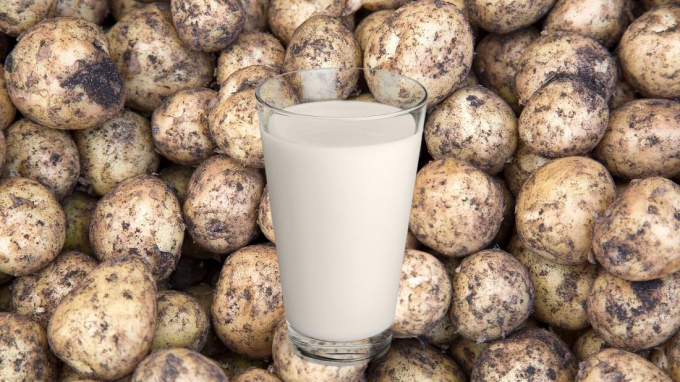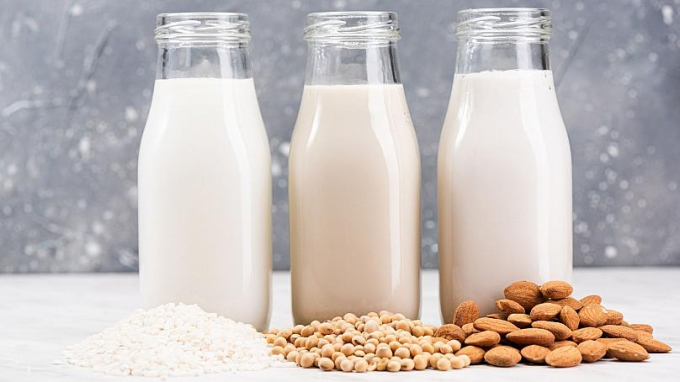May 30, 2025 | 00:48 GMT +7
May 30, 2025 | 00:48 GMT +7
Hotline: 0913.378.918
May 30, 2025 | 00:48 GMT +7
Hotline: 0913.378.918

Potato milk is the new dairy alternative on the block. Photo: Canva
In the UK, nearly a quarter of British people now consume plant-based milk, with that figure rising to 33 per cent among 18-24 year olds.
Entering into this popular and saturated market is new plant-based milk, claiming to be the most sustainable dairy alternative yet: potato milk.
Suitable for vegans and nut-free, Swedish company DUG has just won a 2021 World Food Innovations Award in the Best Allergy Friendly Product Category for its creation. So where does potato milk sit in comparison to other plant-based milks, and with such strong competition, can it have an impact on the market?
Sustainability and the quest for a low carbon footprint have been at the heart of the plant-based milk boom since the beginning. While the carbon footprint of dairy milk varies from country to country, the global average is a whopping 3.0kg CO2 per litre produced.
When compared to oat milk’s average of 0.9kg CO2 per litre, it becomes clear there are huge carbon savings to be made. These facts, coupled with an increasing awareness of climate issues, are what makes the plant-based milk market so lucrative.

Oat milk, soy milk and almond milk are all dairy alternatives. Photo: Canva
Not all milks are created equal though, and shaky green credentials have seen some plant-based milks fall out of favour in the last decade. While almond milk for example, has a low carbon footprint during production, an average of just 0.7kg CO2 per litre, it is environmentally disastrous in other ways.
Around 80 per cent of Almond milk is grown and produced in California, an American state well-known for its droughts. This makes almond milk’s high water production values - 120 litres to produce just one glass - terrible for the local environment.
Though this is still less water than it takes to produce one glass of dairy milk, the carbon footprint of shipping it across the world makes almond milk one of the worst culprits.
Equally, soy milk has had a very rocky relationship with environmentalists. With a low CO2 per kg and low water use, on paper soy is very sustainable.
But due to its use for feeding dairy and livestock, soy production has led to vast areas of the Amazon rainforest being cleared, destroying vital ecosystems in the process.
Taking the green crown at the moment, is oat milk. Widely regarded as the most sustainable milk to date, oat milk uses slightly more CO2 per kg than almonds, but uses less land and significantly less water, making it, until now, the winner across the board.
The new (potato) milk on the block
Created by academic, Professor Eva Tornberg, at Lund University, DUG is the name of the latest plant-based milk to challenge oat milk’s crown. Produced in Sweden, and now available to buy in shops in the UK and online, like most plant-based milks, it is created from an emulsion of the plant-based product - in this case potatoes - and rapeseed oil.
Available in Original, Barista and Unsweetened editions, potato milk is appealing to a young, coffee-fuelled crowd, much like oat milk brands Oatly and Minor Figures before it.
But what are the environmental credentials of potatoes? Well according to DUG, they’re excellent. The company’s website states that growing potatoes is twice as efficient as growing oats per square metre, and that potato milk has a lower carbon footprint than any other plant-based milk, clocking in at a tiny 0.27kg CO2 per litre.
Potatoes are also a fairly easy crop to look after, meaning they need 56 per cent less water than almonds to grow.
While potatoes aren't generally thought of as a ‘healthy’ vegetable, mainly due to the range of unhealthy ways that we consume them - chips, mash and roast potatoes being prime suspects - according to DUG they are packed full of antioxidants and vitamins.
If DUG wants to break into the already over-saturated milk market though, there’s one key thing they need on their side: taste.
So does potato milk have a flavour? To date there's been a fairly positive reception on Amazon, though several reviewers have commented that the milk splits in tea.
This is something they’ll need to deal with if they want to reach a mass audience.
How much further can milk innovation go?
Sales of plant-based food have increased by a huge 49 per cent in Europe in the past two years alone according to this EU-funded research, so it’s no wonder that new companies are trying to enter the market.
Whether the climate footprint of plant-based milk can go any lower, or whether there is public appetite for yet another plant-based milk, remains to be seen.
Have we reached peak plant-based milk - or will we be drinking something even stranger in 2022?
(ERN)

(VAN) Vikas Rambal has quietly built a $5 billion business empire in manufacturing, property and solar, and catapulted onto the Rich List.

(VAN) Available cropland now at less than five percent, according to latest geospatial assessment from FAO and UNOSAT.

(VAN) Alt Carbon has raised $12 million in a seed round as it plans to scale its carbon dioxide removal work in the South Asian nation.

(VAN) Attempts to bring down the price of the Japanese staple have had little effect amid a cost-of-living crisis.

(VAN) Fourth most important food crop in peril as Latin America and Caribbean suffer from slow-onset climate disaster.

(VAN) Shifting market dynamics and the noise around new legislation has propelled Trouw Nutrition’s research around early life nutrition in poultry. Today, it continues to be a key area of research.

(VAN) India is concerned about its food security and the livelihoods of its farmers if more US food imports are allowed.